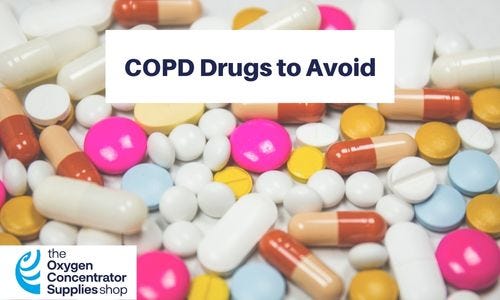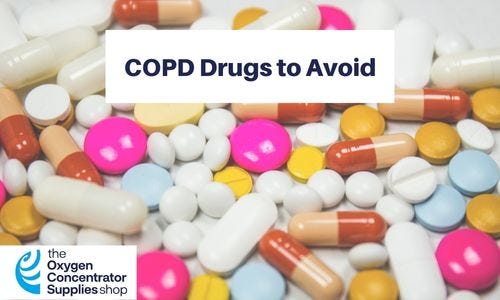While many medications can help with your COPD, there are some you should avoid. Your doctor will help you stay clear of medications that can be harmful. You can also take steps to make sure that you don’t accidentally take medications that can be hazardous by staying informed.


What Medications Should Be Avoided With COPD?
Because of your respiratory condition some medications can make It more difficult to breathe. Many of these medications are available at your local drugstore, which makes them all the more harmful because of their accessibility.
What Are Common Medications For COPD Treatment?
Bronchodilators
Bronchodilators help make breathing easier by opening and relaxing the airways. These are the most common medications for helping COPD patients manage their condition.
Anti-inflammatory medications
Anti-inflammatory drugs help during COPD flare-ups by reducing swelling in the lungs. These medications are good to keep at hand when exacerbations occur.
Combination medications for COPD
A combination of medications can help keep COPD symptoms under control. They many include anti-inflammatory drugs along with bronchodilators prescribed by a doctor to stabilize your respiratory condition.
Other medications for COPD
Other medications your doctor may prescribe include inhalers and steroids to both stabilize flare-ups and also to keep airways clear for healthy breathing.
Here Are Some COPD Drugs To Avoid
Opioid Painkillers
While opioid painkillers may be prescribed in some instances for pain relief after surgeries and other illnesses, for most COPD patients opioids can cause insomnia, depression, and anxiety which can make COPD worse. That's because opioids depress the central nervous system which decreases a person's drive to breathe. Older patients may also experience increased flare-ups when using these medications. Some common opioids often prescribed include:
- Codeine
- Morphine
- Oxycodone
- Hydrocodone
Antihistamines
Antihistamines are used when a person has allergies, a cold, or other mild illnesses. They may seem harmless enough but can harm patients with COPD. They can dry out the lungs and impair breathing in COPD patients. Some common antihistamines include:
- diphenhydramine (Benadryl)
- chlorpheniramine (Chlor-Trimeton)
- cetirizine hydrochloride (Zyrtec)
Cold & Cough Medicines
COPD patients are always at risk for high blood pressure. Most over-the-counter cold and cough medicines can increase blood pressure in COPD patients. it can also cause a difficulty in breathing. Some cold medications include:
- Nyquil
- Theraflu
- Robitussin
Sedatives
Sedatives are medications that a person can take to reduce anxiety and promote relaxation. They can be dangerous to COPD patients as they reduce respiration and breathing. In healthy individuals, respiration greatly reduces, but in COPD patients it could lead to pneumonia and other respiratory illnesses. Some common sedatives include:
- Diazepam (Valium)
- Lorazepam (Ativan)
- Zolpidem (Ambien)Eszopiclone (Lunesta)
Anti-Seizure Medicines
Anti-seizure medicines can cause the lungs to inflame and should be avoided by COPD patients. If you have another medical condition that requires anti-seizure medicine such as epilepsy, speak to your doctor about alternative treatments.
Alcohols
Alcohol of any type can increase inflammation of the lungs, which can contribute to COPD flare-ups. Avoid alcohol to prevent further worsening of your COPD condition.
Diuretics
Diuretics are medications that reduce fluid retention by increasing urine output. It can intensify some of the symptoms of patients with both COPD and congestive heart failure. Diuretics can leave you feeling dehydrated, fatigued, breathless, and generally uncomfortable. Speak to your doctor about managing both conditions effectively without side effects. Some examples of diuretics include:
- Furosemide (Lasix)
- Hydrochlorothiazide
- Spironolactone
Beta Blockers
Beta blockers treat high blood pressure and other heart conditions by blocking the effects of adrenaline. It can result in respiratory spasms, making them a drug that should be avoided by COPD patients. If you are prescribed beta blockers for other health issues, you may have to adjust your bronchodilator dosage to counteract any beta blocker side effects. An example of a beat blocker is propranolol.
Antitussives
Antitussives are used for managing cough symptoms but can be harmful to those with COPD. A productive cough, while annoying for COPD patients, can be helpful for removing sputum from the respiratory system. Antitussives can suppress the cough and thus may cause worse infections in the lungs. Some examples of antitussives include:
- Dextromethorphan
- Benzonatate
- Codeine
Nicotine
Smoking can cause COPD and can worsen symptoms. No COPD patient should continue smoking once diagnosed. Vaping is also not recommended for COPD patients.
Sugar
Patients with high blood sugar may be aggravating their COPD symptoms. Managing glucose levels with COPD is critical for preventing symptoms. Avoiding too much sugar in your diet may be one solution for preventing more severe COPD symptoms if blood sugar levels are already a problem.
Oxygen
While supplemental oxygen can be helpful for COPD patients, too much can be harmful. Your doctor will prescribe oxygen carefully for managing your respiratory illness at home. Too much oxygen can cause hypoventilation which raises the level of carbon dioxide in the blood and may cause interruptions in breathing. While oxygen therapy is very beneficial to receiving supplemental oxygen, it is strongly recommended to use your oxygen concentrator carefully and only as your doctor prescribes.
Concluding Thoughts
COPD patients should be very careful when it comes to taking any unprescribed medications. Know the risks and speak to your doctor before using over-the-counter medications to treat minor ailments. While these products may be harmless to most people, they carry a serious risk for COPD patients. If you have COPD and would like to learn more about this condition, give The Oxygen Concentrator Supplies Shop a call today! Our expert staff would be happy to better inform you and also provide product suggestions that best suit you and your oxygen therapy needs.



